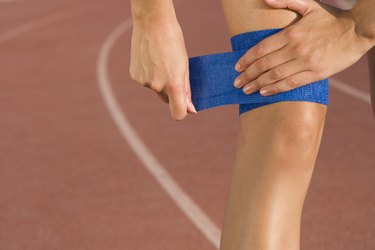
A torn ligament can be a debilitating injury that keeps you from enjoying your favorite activities for several weeks or months. Recovering from a torn ligament requires patience and diligence to properly support your healing tissue while avoiding further damage. Your diet and nutrition play an important part in ensuring a successful recovery.
Fruits and Vegetables
Video of the Day
Add plenty of fruits and vegetables, which are high in antioxidants, to your diet to heal a ligament injury. According to researchers at the Sport Science Department, The Orthopedic Specialty Hospital, Murray, Utah, study participants took antioxidant supplements for two weeks before and three months after surgery to heal a torn anterior cruciate ligament, one of the ligaments that stabilizes the knee. Compared to a control group, results showed decreased levels of inflammatory molecules called isoprostanes in the group that took antioxidants, implying decreased inflammation and healing time. The study was published in the 2009 issue of the journal "Redox Report."
Video of the Day
Vitamin C
Make vitamin C-containing foods a part of your ligament repair diet. This vitamin is a helpful nutrient for repairing all connective tissues due to its role in the production of collagen, an important protein that forms the structural basis for tendons and ligaments. Vitamin C was used successfully to prevent inflammation following ligament repair surgery in a study published in the March 2009 issue of the journal "Free Radical Biology and Medicine." Foods high in vitamin C include both sweet and hot peppers, fresh herbs, such as parsley and thyme, dark green vegetables, citrus fruits and strawberries.
Protein
High-quality protein sources, such as salmon and lean meats, provide protein for tissue repair of bones, tendons and ligaments, according to an article in the April 2007 issue of "Runner's World." The healing process entails building new cells from scratch and uses up a considerable amount of your body's available resources. Provide your cells with sufficient amounts of protein during this time period, to promote optimal tendon regeneration, to keep your muscles strong and healthy and to prevent depletion of these and other nutrients. If you are an athlete, eat some protein at each meal. Have a total of four to five servings per day.
Zinc and Copper
Zinc-containing foods may support ligament repair, according to a study published in the October 2001 issue of the journal "Clinica Chimica Acta." This mineral prevents oxidative damage. Copper is a nutrient mineral that helps protect ligaments and also contributes to the oxygen-carrying molecules hemoglobin in the blood and myoglobin in the muscles. Food sources of zinc include beef, pork, lamb and dark parts of poultry. Zinc is also found in nuts, whole grains and legumes. Copper is found in shellfish, whole grains, beans, nuts, potatoes, and organ meats, dark leafy greens, dried fruits such as prunes, cocoa and black pepper.
- "Redox Report"; Antioxidant Supplementation Lowers Circulating Igf-1 but Not F(2)-isoprostanes Immediately Following Anterior Cruciate Ligament Surgery; T. Barker, et al.; 2009
- "Free Radical Biology and Medicine"; Antioxidant Supplementation Lowers Circulating Igf-1 but Not F(2)-isoprostanes Immediately Following Anterior Cruciate Ligament Surgery; T. Barker, et al.; March 2009
- Runner's World; Food Aid; Kelly Bastone; April 2007
- "Clinica Chimica Acta"; Minerals, Trace Elements and Related Biological Variables in Athletes and During Physical Activity; M. Speich, et al.; October 2001
- MedlinePlus.com: Zinc in Diet
- MedlinePlus.com: Copper in Diet
Is this an emergency? If you are experiencing serious medical symptoms, please see the National Library of Medicine’s list of signs you need emergency medical attention or call 911.